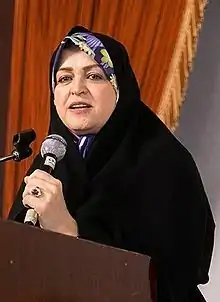Zahra Eshraghi
Zahra Eshraghi Khomeini (Persian: زهرا اشراقی, romanized: Zahrâ Eshrâqi) (born 1964) is an Iranian activist and former government official who believes in feminism and human rights.
Zahra Eshraghi | |
|---|---|
| زهرا اشراقی | |
 | |
| Born | 1964 (age 58–59) |
| Spouse | Mohammad Reza Khatami |
| Children | Alireza, Fatemeh[1] |
| Parent(s) | Shahab od-Din Eshraghi (father) Sedigheh Khomeini (mother) |
| Relatives | Ruhollah Khomeini (grandfather) Khadijeh Saqafi (grandmother) |
Early life and education
Eshraghi was born in 1964. She is the granddaughter of Ayatollah Khomeini.[2] She is a philosophy graduate.[3]
Views
Zahra Eshraghi wants the wearing of headscarves to no longer be compulsory. She believes that: "Our (Iran's) constitution still says that the man is the boss and the woman is a loyal wife who sacrifices herself for her family. But society here has changed, especially in the last 10 years. If my grandfather were here now, I am sure he would have had very different ideas."[4]
She also stated "The constitution my grandfather approved says that only a man can be president... We would like to change the wording from 'man' to 'anyone'. But discrimination here is not just in the constitution. As a woman, if I want to get a passport to leave the country, have surgery, even breathe almost, I must have permission from my husband."[4]
Personal life
In 1983, Eshraghi married Mohammad-Reza Khatami, former head of the Islamic Iran Participation Front, the main reformist party in Iran and younger brother of former president Mohammad Khatami.[5] They have two children, a daughter, Fatemeh, and a son, Ali.
Politics
In 2004, Eshraghi was blocked from running for parliament by the Guardian council, which vets the parliamentary candidates.[6][7]
See also
References
- "سرگذشت فرزندان آیت الله خمینی".
- "Khomeini's Granddaughter On Iran's 'Critical Situation,' Sanctions, Facebook". Radio Free Europe. 15 January 2013. Retrieved 20 February 2013.
- "Khomeini's granddaughter fights for women's rights". The Washington Times. Tehran. 18 June 2005. Retrieved 20 February 2013.
- Freeman, Colin (19 June 2005). "'If I want to breathe I must have permission from my husband'". The Telegraph. Tehran. Retrieved 20 February 2013.
- Sciolino, Elaine (2 April 2003). "Daughter of the Revolution Fights the Veil". The New York Times. Retrieved 9 October 2012.
- "Iran's Revolutionary Grandchildren". The New Yorker. 2016-02-12. Retrieved 2022-05-05.
- "The Guardian Council | Iran Data Portal". Retrieved 2022-05-05.